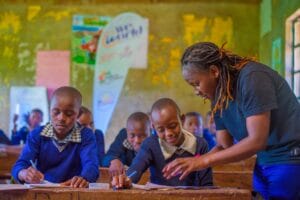
We have always been at the forefront of defending the rights of women and children in the world's most vulnerable contexts. We believe that every child should be able to live in safety, have access to education, grow up free from violence and actively participate in the decisions that shape their lives. It was in this spirit that on April 8, 2025, we participated in Brussels in the multi-stakeholder dialogue on how today’s decisions can better safeguard children’s rights sponsored by the ChildFund Alliance, which operates in more than 70 countries and reaches nearly 30 million children. A crucial meeting to reaffirm children's right to the future that aims to define steps to incorporate children's recommendations into funding priorities and programs that address not only immediate needs but also long-term development.
The meeting brought together representatives of European institutions, experts in cooperation and humanitarian aid, members of civil society and, most importantly, the voices of children. At the center of the discussion was the World Index 2024, presented by Dina Taddia, CEO of WeWorld, who announced our commitment: “We want to amplify the voices of children and adolescents, who are still significantly underrepresented but the ones most affected by crises. People often talk about them, but they are not truly listened to.” The index analyses respect for women's and children's rights in 157 countries and is based on quantitative and qualitative data that includes the opinions of more than 10,000 young people in 41 countries.
What emerges from the report is a troubling but not surprising reality: millions of children don't feel safe, don't have equitable access to education and are systematically excluded from decision-making processes. Their testimonies are clear: “I don't feel safe going to school”, “No one asks us what we think”, “I would like to study, but my family cannot afford it”. These are not exceptions; they are the reality for too many.
During the event, we also presented our Right to the Future project, which was created specifically from the will to listen to, value and integrate the voices of children and adolescents. Our aim is simple but ambitious: to transform their needs, desires and fears into concrete political actions. To do that, we need a paradigm shift: children's participation is not a luxury, it is a fundamental right.
“Children aren't merely recipients of aid; they are active agents in shaping their own futures. Our challenge now is to dismantle the barriers that prevent their meaningful inclusion in policy decisions. We must shift from seeing child participation as a 'nice-to-have' to recognizing it as a non-negotiable right”.
As Meg Gardinier, Secretary General of ChildFund Alliance, pointed out, we need to stop viewing children as mere recipients of aid and start recognizing them as active agents of change. This means including them in decision-making processes at all levels, from local to international.
“A right to the future means the full package of human rights—not just the crumbs. We are living in one of the worst moments in history, a time that threatens millions of people. We must stand firm, and in the strongest possible way, to ensure that children have a deeply interconnected right to the future”.
The words of Cecilia Strada, European Parliament member and human rights advocate, define the “right to the future” as an indivisible package of human rights to be guaranteed today, not tomorrow. "International commitments must be translated into tangible benefits. We need to work together and build new alliances. Key words are hope, safety, education, sustainability, and justice”, reiterating how crucial and valuable the work of NGOs, such as WeWorld, is in building bridges between local communities and European institutions.
The World Index presentation highlighted some key data:
- More than 1 in 4 children believe that adults do not really promote their rights.
- 1 in 3 say they are rarely or never listened to by adults.
- 4 in 10 feel unsafe because of violence, war or crime.
- Children from marginalized groups perceive even weaker rights protection.
These numbers show a collective urgency: we need to do more and do it better. Our role as WeWorld is also this: to turn data into advocacy tools, voices into policies, needs into priorities.
In addition to the presentation of the Index, the dialogue featured a panel discussion with experts in the field, including Edouard Junior Ndeye (Educo Sahel Director), our colleague Elena Colesnicova from the WeWorld Moldova Community Center, Enric-Sol Brines i Gómez (Head of the Spanish Agency for International Development Cooperation) and Benoit Van Keirsbilck (Executive Director of DCI-Belgium and member of the UN Committee on the Rights of the Child).
During the event, the animated short film “Amal,” produced by WeWorld in collaboration with Factanza, was screened: the touching story of a Syrian girl who, facing a thousand obstacles in a conflict zone, doesn’t give up her right to education. A tale that reflects the story of millions of children around the world who are denied access to safe and inclusive learning environments.
The dialogue concluded with a strong joint call by the Joining Forces coalition and European institutions, represented by UNICEF's Bertrand Bainvel, to recognize the integrated participation of children as a foundational element of international policies. Not a decorative addition but an indispensable principle.
With our partners, institutions and, above all, the children who must be protagonists in the decisions that affect their present and their future, we’ll continue to work in this direction. Because, as we often recall, children don’t need to be protected from participation but through participation.



